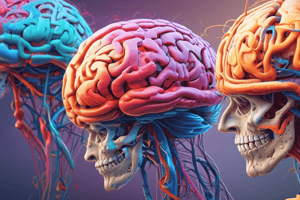Podcast
Questions and Answers
A patient presents with a progressive loss of motor coordination and a constant tremor. Which of the following conditions is the MOST likely diagnosis?
A patient presents with a progressive loss of motor coordination and a constant tremor. Which of the following conditions is the MOST likely diagnosis?
- Cerebral palsy
- Multiple sclerosis
- Parkinson's disease (correct)
- Huntington's disease
Which of the following diseases is an autoimmune disorder that directly impairs the body's ability to regulate blood sugar levels?
Which of the following diseases is an autoimmune disorder that directly impairs the body's ability to regulate blood sugar levels?
- Infectious mononucleosis
- Asthma
- Type 1 Diabetes (correct)
- Type 2 Diabetes
A patient diagnosed with quadriplegia has experienced paralysis in which areas of their body?
A patient diagnosed with quadriplegia has experienced paralysis in which areas of their body?
- The upper extremities only
- Only the lower extremities
- All four extremities (correct)
- One side of the body
Which of the following conditions is caused by damage to the myelin sheath surrounding nerve fibers in the central nervous system?
Which of the following conditions is caused by damage to the myelin sheath surrounding nerve fibers in the central nervous system?
Which of the following conditions is characterized by chronic inflammation resulting from the body's immune system attacking its own tissues and organs?
Which of the following conditions is characterized by chronic inflammation resulting from the body's immune system attacking its own tissues and organs?
Genetic testing can identify carriers of which of the following diseases, characterized by progressive mental and physical deterioration?
Genetic testing can identify carriers of which of the following diseases, characterized by progressive mental and physical deterioration?
A patient is experiencing airflow blockage and breathing difficulties. Which of the following conditions is the MOST likely cause?
A patient is experiencing airflow blockage and breathing difficulties. Which of the following conditions is the MOST likely cause?
Which of the following diseases is caused by bacteria that invades lung tissue?
Which of the following diseases is caused by bacteria that invades lung tissue?
Flashcards
Epilepsy
Epilepsy
Disease of the CNS marked by seizures.
Parkinson's disease
Parkinson's disease
Progressive degeneration of basal ganglia affecting motor coordination; characterized by tremors.
Multiple sclerosis
Multiple sclerosis
Disease caused by damage to the myelin sheath, affecting nerves; causes various sensory and motor issues.
Huntington's disease
Huntington's disease
Signup and view all the flashcards
Polio
Polio
Signup and view all the flashcards
Dementia
Dementia
Signup and view all the flashcards
Asthma
Asthma
Signup and view all the flashcards
Hepatitis
Hepatitis
Signup and view all the flashcards
Study Notes
Neurological Diseases
- Epilepsy: A central nervous system (CNS) disorder characterized by seizures.
- Parkinson's Disease: Progressive degeneration of basal ganglia, leading to impaired motor coordination and tremors.
- Cerebral Palsy: Chronic, non-progressive disorder, marked by lack of muscle control.
- Multiple Sclerosis: Damage to myelin sheath covering nerves, causing numbness, double vision, and cognitive problems.
- Huntington's Disease: Genetic disorder causing mental and physical deterioration. A mutation in the Huntingtin gene is the cause.
- Polio: Highly contagious viral disease primarily affecting children, attacking spinal nerves and destroying motor neuron cell bodies.
- Paraplegia: Paralysis of lower extremities.
- Quadriplegia: Paralysis of all four extremities.
- Infectious Mononucleosis: Viral disorder, with symptoms such as fever, sore throat, and overall weakness. An unusually high number of monocytes is characteristic.
- Lymphoma: A tumor of the lymphatic system.
Other Diseases
- Dementia: Severe loss of cognitive ability beyond normal aging.
- Diabetes Type 1: An autoimmune disorder in which the body attacks the pancreas cells responsible for insulin production.
- Diabetes Type 2: Body does not produce enough insulin or is resistant to the effects of insulin; often related to lifestyle.
- Atherosclerosis: Narrowing of arteries by plaque buildup of cholesterol and other substances.
- Myocardial Infarction (MI, Heart Attack): A blood clot prevents blood flow to the heart.
- Ischemia: Inadequate blood flow and oxygen to the heart.
- Asthma: Severe inflammatory reaction often triggered by foreign substances such as allergens, causing difficulty breathing.
- Viral and Bacterial Infections: Invasion of the respiratory tract by viruses or bacteria.
- Chronic Obstructive Pulmonary Disease (COPD): Group of diseases causing airflow blockage and breathing problems.
- Pneumonia: Infection of the lungs.
- Tuberculosis and Pleurisy: Infectious disease caused by Mycobacterium tuberculosis affecting lung tissue.
- Lung Cancer: Tumor originating in the lungs.
- Gastroesophageal Reflux Disease (GERD): Abnormal acid reflux into the esophagus.
- Gastroenteritis, Diarrhea, and Dysentery: Inflammation of the stomach and small intestine lining causing watery and frequent bowel movements; dysentery involves bacteria or protozoa infection.
- Peptic Ulcer: Open sore in the stomach or duodenum lining.
- Appendicitis: Bacteria proliferation in the appendix.
- Hepatitis: Inflammation of the liver.
- AIDS: Immunodeficiency syndrome caused by HIV infection.
- Lupus: Autoimmune disorder where the body attacks its own tissues and organs.
- Tonsillitis: Tonsil inflammation, potentially hindering the ability to filter out bacteria.
Studying That Suits You
Use AI to generate personalized quizzes and flashcards to suit your learning preferences.




